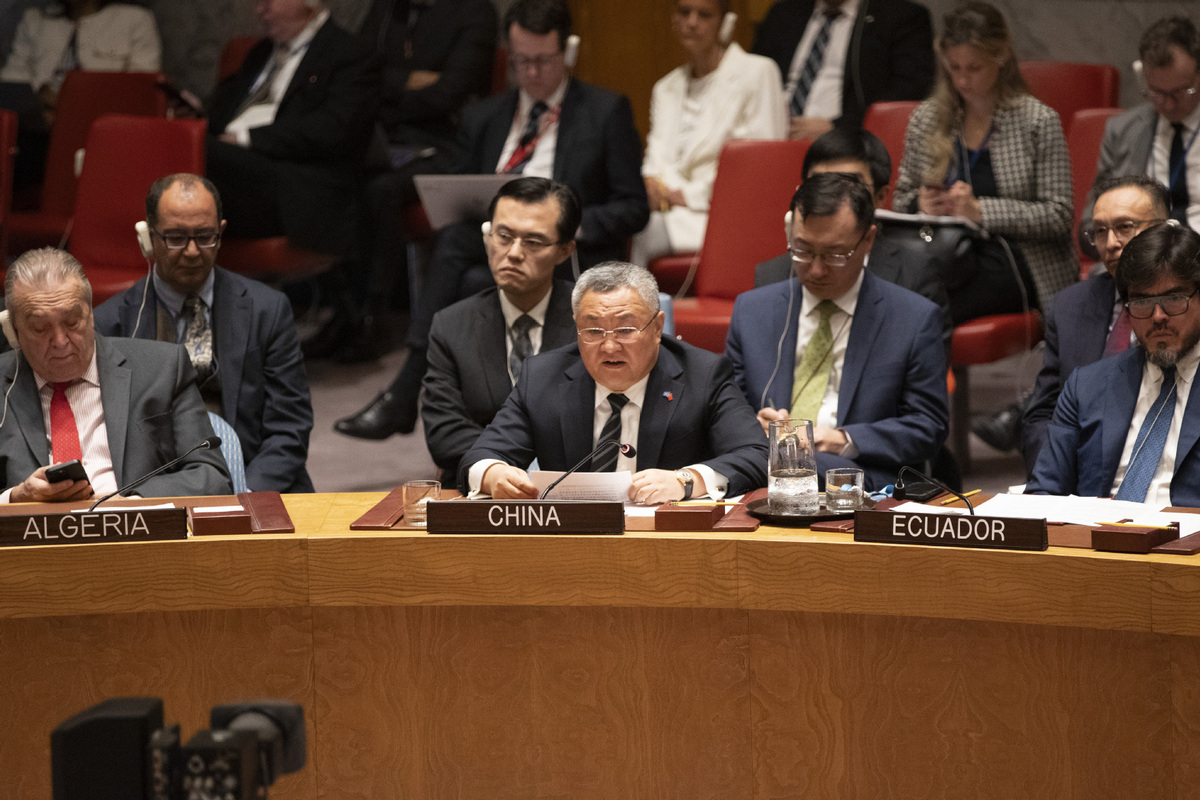
Fu Cong (front row, center), China's permanent representative to the United Nations, speaks at an emergency meeting of UN Security Council on tension in the Middle East at UN headquarters, New York, US on Oct 2, 2024. [Photo/Xinhua]
China on Tuesday represented 28 Global South countries and delivered a joint statement at the United Nations opposing unilateral coercive measures and urging countries imposing them to "immediately and completely cease such practice."
"Developing countries and their populations continue to fall victim to unilateral coercive measures, which violate the principle of sovereign equality and cooperation, intervene in other countries' internal affairs, and disregard the purposes and principles of the Charter of the United Nations and international law, multilateralism and the basic norms of international relations," Fu Cong, China's permanent representative to the UN, told the Third Committee of the General Assembly at its 79th session.
Fu delivered the joint statement on behalf of a cross-regional group of 28 member states, including the State of Palestine, Egypt, Iran, Pakistan, the Russian Federation, Cuba, the Democratic People's Republic of Korea, South Sudan, Sri Lanka and others.
"Despite the global call to urgently lift unilateral coercive measures, the imposition of these illegal measures continues to cause devastating, sometimes even life-threatening consequences, to targeted countries and their peoples," Fu said.
Unilateral coercive measures, coupled with secondary sanctions and over-compliance, "exacerbate existing humanitarian and economic challenges, gravely affect the stability of the global production and supply chains, as well as food, energy and financial security, and seriously undermine the world economic order and the efforts of the countries concerned to achieve sustainable development goals," he added.
In September, Alena Douhan, the UN special rapporteur on the negative impact of the unilateral coercive measures, submitted her report to the 57th session of the UN Human Rights Council in Geneva.
In her report, Douhan said that unilateral sanctions imposed by the United States and other countries on China violate international law, negatively affecting the human rights of the Chinese people and causing spillover effects.
The report also says unilateral coercive measures have led to a serious shortage of medicines, vaccines and medical equipment in the countries targeted, and that it has led to a rise in mortality rates, leaving those in vulnerable situations such as women, children, the elderly and the disabled in a particularly difficult situation.
"We recognize the work done by the special rapporteur on the negative impact of unilateral coercive measures on the enjoyment of human rights for the United Nations Human Rights Council and take note of the reports, country visits and statements delivered by the special rapporteur," Fu said.
"We are also concerned that unilateral coercive measures and over-compliance have limited the ability of affected countries to access and acquire foreign investment and technologies, and hindered international cooperation in culture, arts, sports, travel, people-to-people exchanges and transport, including civil aviation," said Fu.
In recent years, the United States has implemented a range of unilateral measures against China, including restrictions on semiconductor exports, limitations on key technologies and sanctions on certain Chinese companies.
On Thursday, the United States imposed sanctions on two Chinese companies that it accused of "directly assisting" Russia in developing long-range attack drones used in the Ukraine war.
China's Foreign Ministry said it firmly opposes the US imposing illegal unilateral sanctions against Chinese companies and does not accept "groundless" accusations and pressure from the US.
Globally, the US has imposed broad economic and financial sanctions on countries such as Iran, North Korea, Russia and Venezuela, limiting their trade, energy exports and banking operations.


